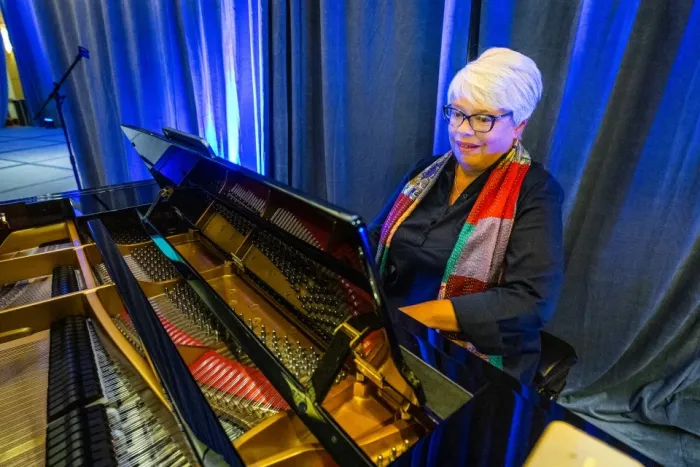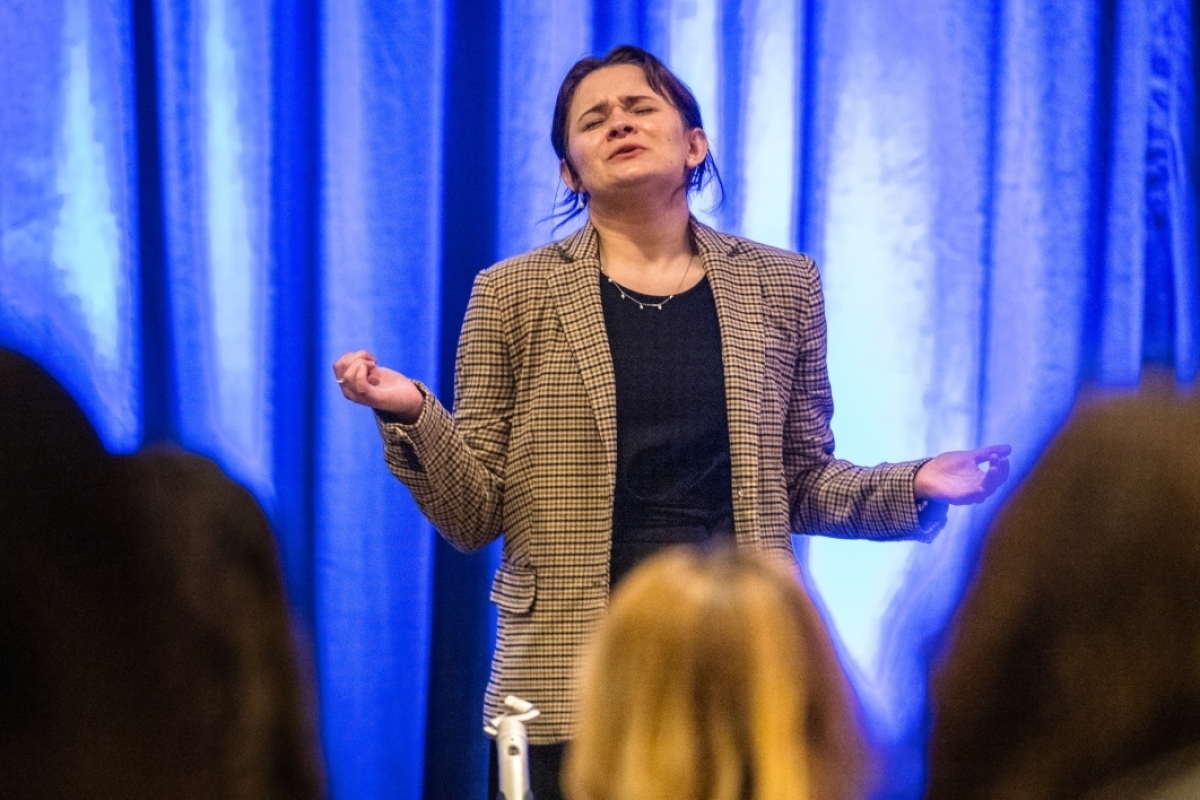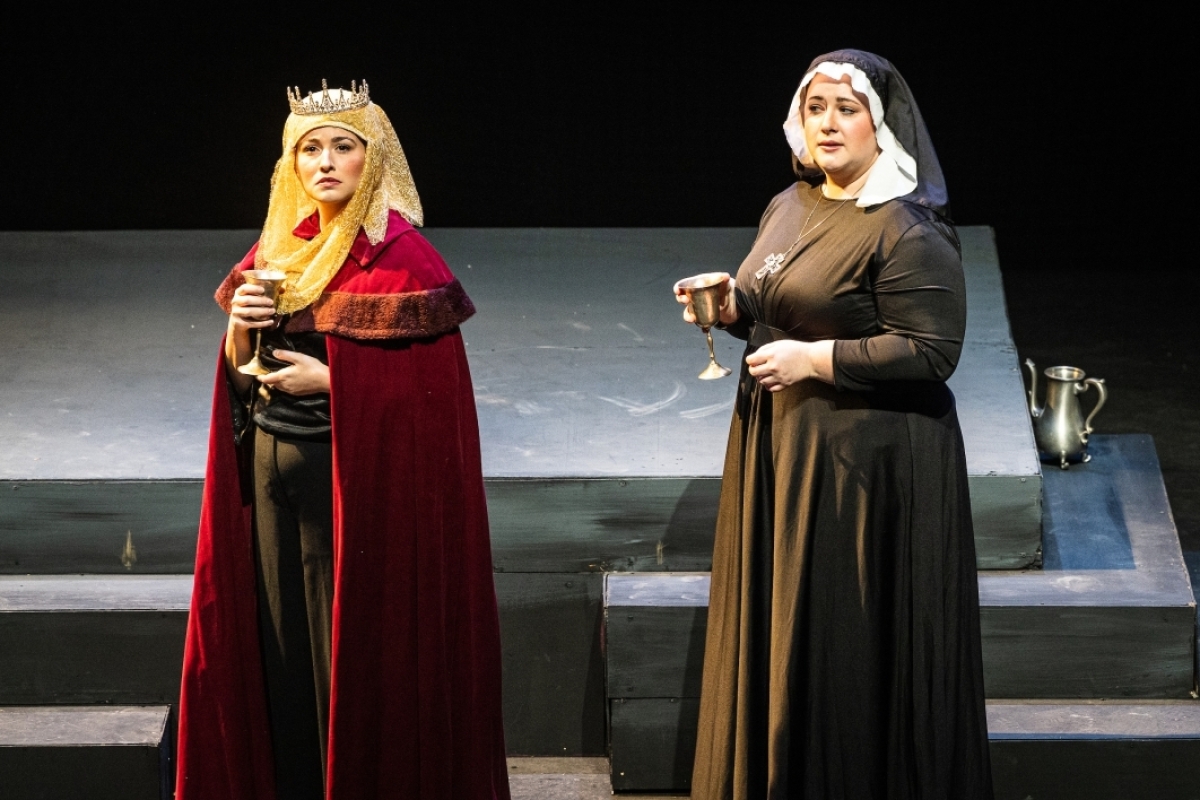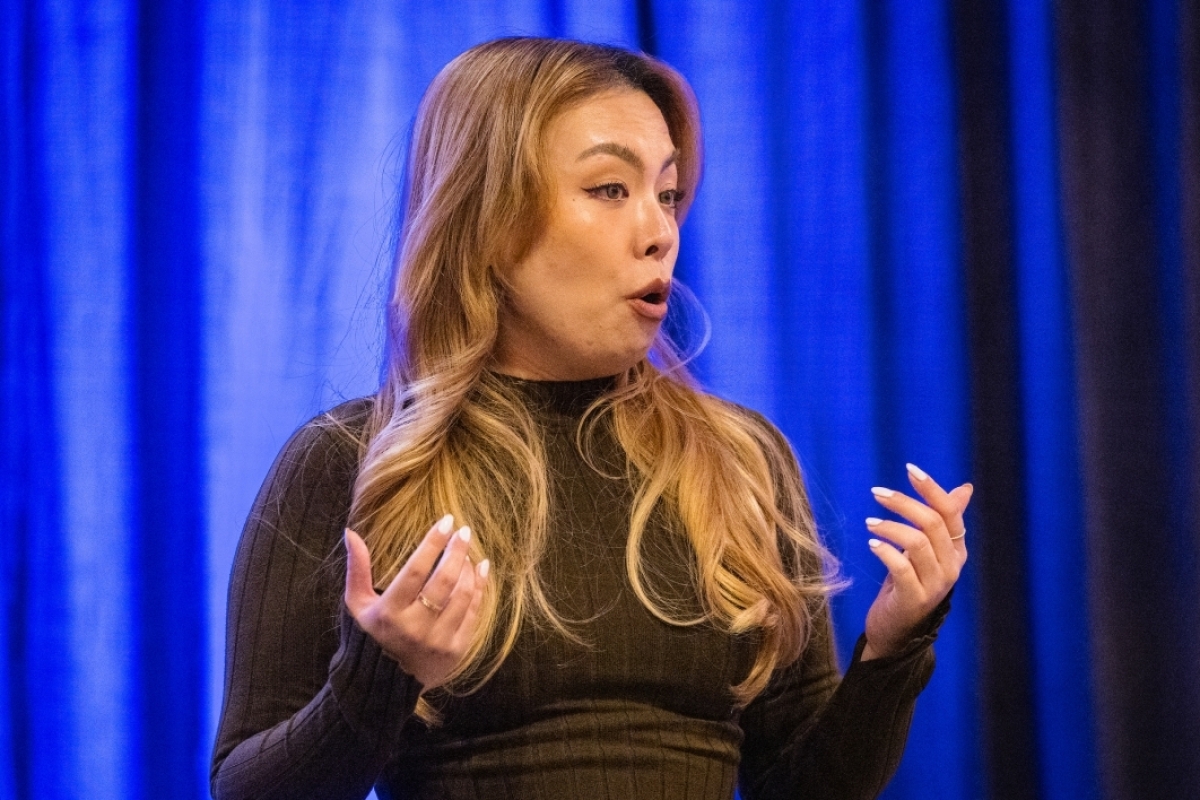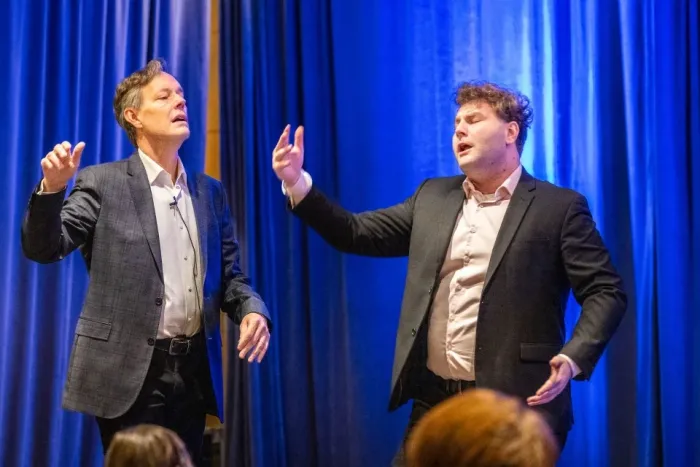ASU opera students shine at national conference
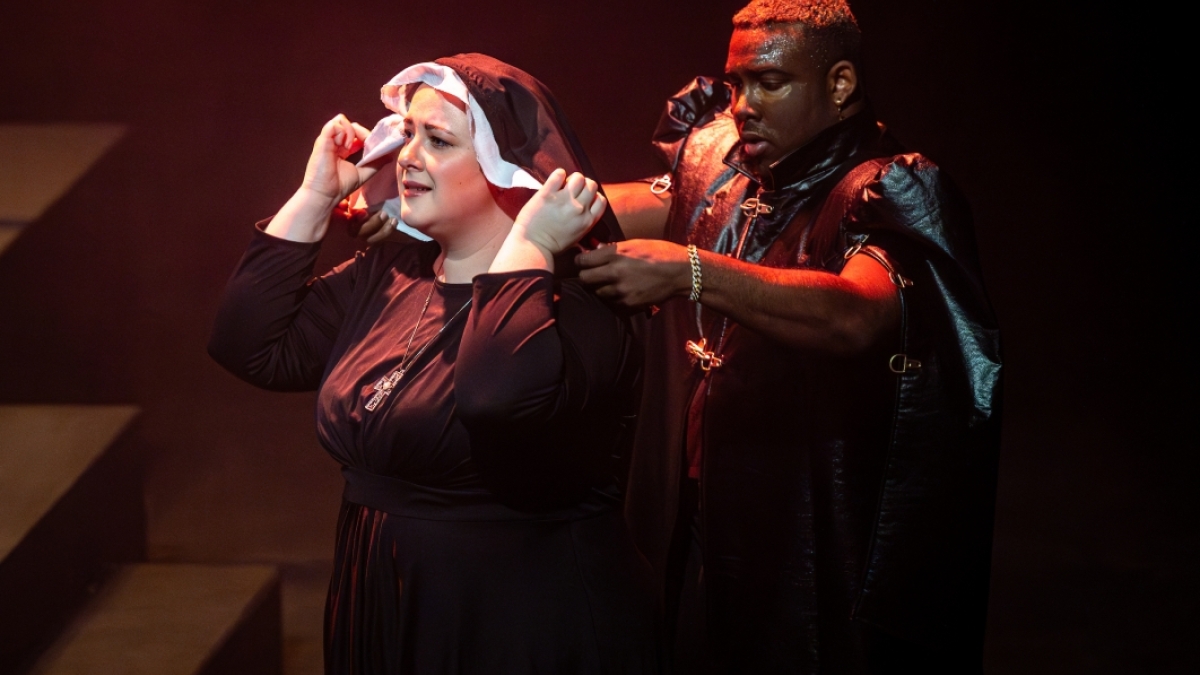
ASU students Carlie Beckert and Joshua Pierre Moore performed the modern opera "Sanctuary and Storm" at the Evelyn Smith Music Theatre on the Tempe campus as part of the National Opera Association's annual conference, which was hosted by ASU on Jan. 3–6. Photo by Charlie Leight/ASU News
The opera world is changing as modern compositions are increasingly embraced, and one of Arizona State University’s most successful alums said that academic institutions are important in that journey.
Kathleen Kelly, an opera conductor, pianist and teacher, gave that message at the National Opera Association’s annual conference, which was hosted by ASU on Jan. 3–6.
“‘New music’ used to refer to this specialized thing in a different part of the building from the opera program,” she said.
“One of the things that’s been so amazing to see at Arizona State that’s such a boon to this school is that there is no division anymore between musical theater and opera.”
ASU faculty, staff and students in the Music Theatre and Opera program were integral to the conference, helping with organizing, participating in competitions and speaking on panels. Student performers and crew members rehearsed over winter break to stage a performance of the modern opera “Sanctuary and Storm” as part of the conference, featuring students Carlie Beckert, Holly Bingham and Joshura Pierre Moore.
In addition, ASU won second place in the Robert Hansen Scenes Competition for a selection from “Little Women the Musical,” featuring students Saylem duPont, Tre Moore and Lauren Carroll. That was in addition to a third-place win for opera production for last year’s production of “Daughter of the Regiment.”
Kathleen Kelly, an alum of ASU's opera program, played the piano during the master class held by Jake Heggie at the National Opera Association conference at the Tempe Mission Palms hotel. Photo by Charlie Leight/ASU News
Kelly, who received a bachelor’s degree and a master’s degree in piano performance at ASU in the 1980s, presented at a panel discussion titled “Supporting Singers and Pianists in 21st Century Repertoire.”
Kelly said that the “seismic shift” in the industry can be challenging for university opera programs.
“Our industry is in a dynamic period of extreme reinvention, motivated by important social movements, and both interrupted and pushed forward by the pandemic.
“Our developing singers and pianists need help keeping up,” said Kelly, who found her passion for opera while working as a pianist for ASU’s Lyric Opera Theatre for tuition money during grad school.
While opera companies are programming more 21st century repertoire, it’s difficult for academic institutions to be as nimble as professional companies, she said.
“Most university curricula, and for that matter, most competitions, still emphasize in their requirements music that is a century old or older.
“Let’s be clear — we love old music. But the balance between old and new in many curricula is increasingly out of step with the balance found in professional activity.”
Kelly’s session also covered other contemporary challenges — the prevalence of content on Spotify and YouTube influencing audition repertoire, the use of recorded accompaniment rather than a pianist and the difficulty pianists have with scores composed on a computer program.
Brian DeMaris, artistic director of the Music Theatre and Opera program in the School of Music, Dance and Theatre, said that about 100 students are studying in the program, which will mark 60 years this semester.
“Our alumni are unique because in musical theater and opera, they end up doing both, and we have alumni performing with all of the major opera houses of the world,” he said.
Other prominent alumni include Angela Brower, Daveda Karanas and Bridget Everett, a cabaret singer and star of the HBO show “Somebody, Somewhere.”
DeMaris said ASU was honored to host the conference, especially because the theme, “Our Sounds and Stories,” focused on new works and living composers.
“ASU has been intentional the past decade on developing and workshopping works with living composers, so it’s very fitting because we put so much energy into new works,” he said.
“Sanctuary and Storm” was performed by ASU because it won the Dominick Argento Chamber Opera Competition at the 2022 National Opera Association conference.
The most successful contemporary opera, “Dead Man Walking,” debuted in 2000 and was written by composer Jake Heggie, who gave the keynote at the conference.
Heggie also led a master class for several students, including four from ASU. Each performed one of Heggie’s songs in front of the packed ballroom and he provided feedback — much of it working with the singers to emphasize their emotions.
“The thing I want is for you to personalize these songs and take them as far as you can,” he said.
“The goal is stillness, so just a little movement means a lot.”
Shaul Leket-Mor, who is pursuing a master’s degree in opera performance at ASU, performed “A Hundred Thousand Stars” from “For a Look or a Touch,” which is about the thousands of LGBTQ+ people who were murdered during the Holocaust.
Leket-Mor said that as a Jewish person, he had a deep connection to the song already, but Heggie worked with him to more forcefully display the emotions of the piece.
Opera composer Jake Heggie (left) works with ASU graduate student Shaul Lekert-Mor during a master class at the National Opera Association's annual conference, which was hosted by ASU Jan. 3–6. Photo by Charlie Leight/ASU News
“You must be a joyful vessel even when it’s a mournful song,” Heggie told him.
“You must always be that vibrating vessel that can’t wait to tell the story. Then you’re giving it away instead of holding onto it.”
The two walked around the stage with hands clasped together as Leket-Mor recited the lyrics as a monologue.
“Try it angry. Try it silly. Try it with an accent,” Heggie said.
Later, Leket-Mor said he was grateful for the feedback on character analysis and acting. When learning lyrics in Italian, he’ll recite them as a monologue, but he’s never done it in English before.
“I feel like I learned how to find joyful moments for a character that is deeply traumatized and still (trying) to express something happy, even within a moment of great sadness,” he said.
“It allowed me to free myself up.”
Saylem duPont, a fourth-year student double majoring in vocal performance and music learning and teaching, sang “In the Beginning” from “Of Gods and Cats.” Her performance included some saucy expressions and emoting, and Heggie encouraged her to push it even further.
“Keep having fun and exploring,” he said.
“You really had us in the palm of your hand. Imagine doing it from the base of your spine.”
DuPont said that participating in the master class was a dream come true.
“I’m a big fan of his work, so getting to perform not only in a room full of peers and people in the industry but for the composer of a work I love so much was terrifying, but in a fun way,” she said.
“Sometimes in a performance, it’s easy to get to caught up in every little minute detail, and his feedback and thoughts helped to remind me to take time and take up space — to really be in the moment and breathe.”
More Arts, humanities and education

Pen Project helps unlock writing talent for incarcerated writers
It’s a typical Monday afternoon and Lance Graham is on his way to the Arizona State Prison in Goodyear.It’s a familiar scene. Graham has been in prison before.“I feel comfortable in prison because of…

Phoenix civil rights activists highlighted in ASU professor’s latest book
As Phoenix began to grow following WWII, residents from other parts of the country moving to the area often brought with them Jim Crow practices. Racism in the Valley abounded, and one family at…

Happy mistake: Computer error brings ASU Online, on-campus students together to break new ground in research
Every Thursday, a large group of students gathers in the Teotihuacan Research Laboratory (TeoLab) in the basement of the School of Human Evolution and Social Change building on Arizona…


